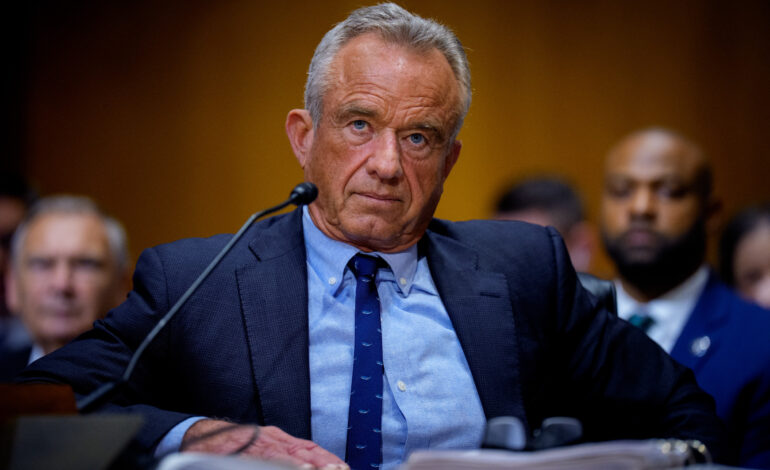Democrats Demand Resignation of Health Secretary Kennedy Jr.

Calls for the resignation of Department of Health and Human Services (HHS) Secretary Robert F. Kennedy Jr. have intensified following his testimony before the Senate Finance Committee on September 4, 2023. This scrutiny comes in light of Kennedy Jr.’s controversial decisions regarding leadership changes at the Centers for Disease Control and Prevention (CDC), including the recent removal of CDC Director Susan Monarez.
Kennedy Jr. dismissed Monarez from her position last month, a move that triggered resignations from three senior CDC leaders in protest. Initially, he did not provide a clear reason for the dismissal, but during his Senate testimony, he claimed that Monarez was not “trustworthy.” He recounted a conversation where he asked her directly about her trustworthiness, to which she reportedly responded, “no.” Kennedy Jr. characterized the CDC as needing significant cultural change, stating, “there’s a lot of trouble at the CDC, and it’s going to require getting rid of some people over the long term.”
Monarez’s legal representatives countered Kennedy Jr.’s assertions, claiming that she refused to endorse what they termed “unscientific and reckless directives.” The discontent surrounding Kennedy Jr. escalated during the Senate hearing, where committee members questioned his judgment and the implications of his recent actions.
Democratic Senators Unite Against Kennedy Jr.
Following the testimony, members of the Senate Finance Committee released a statement urging Kennedy Jr. to resign, labeling him “unfit to serve.” They expressed concern over his leadership, stating, “The actions Robert Kennedy has taken since he was sworn in reinforce the danger he poses to the health of America.” This sentiment was echoed across party lines, with calls for his resignation coming from various Democratic senators.
Notable signatories of the resignation letter included Ron Wyden of Oregon, Michael Bennet of Colorado, and Elizabeth Warren of Massachusetts, among others. Only Sheldon Whitehouse of Rhode Island abstained, although he reiterated his opposition to Kennedy Jr.’s nomination. Patty Murray, a senator from Washington, also voiced her concerns, stating on X that she had “serious doubts” about Monarez’s ability to stand against Kennedy Jr.’s agenda.
In addition, John Larson, a Democratic representative from Connecticut, criticized Kennedy Jr. for his anti-vaccine stance within the CDC, further fueling the call for his resignation.
Republican Frustration Grows
While some Republican senators have expressed frustration with Kennedy Jr.’s actions, none have formally called for his resignation. Bill Cassidy, a senator from Louisiana and a physician, criticized the cancellation of mRNA vaccine research contracts, which had garnered praise during the previous administration. Thom Tillis of North Carolina questioned the inconsistency in Kennedy Jr.’s views about Monarez, challenging his claim that she was previously “unimpeachable.”
Senator John Barrasso, the Senate Republican Whip, highlighted his concerns regarding Kennedy Jr.’s commitment to vaccine standards. He stated, “Americans don’t know who to rely on. If we’re going to make America healthy again, we can’t allow public health to be undermined.”
In a demonstration of widespread concern, over 1,000 current and former HHS employees signed an open letter demanding Kennedy Jr.’s resignation. They cited actions they believe endanger public health, particularly following a recent shooting incident at the CDC headquarters that heightened fears among staff members. The letter warned that Kennedy Jr.’s leadership is compromising national health, echoing sentiments shared by family members who have publicly decried his actions as a threat to American wellness.
What remains uncertain is whether President Donald Trump will intervene in this escalating situation. Trump recently expressed his support for Kennedy Jr., asserting that he is “a very good person” with “some little different ideas” that could be beneficial.
The unfolding political drama surrounding Secretary Kennedy Jr. raises critical questions about the future of public health leadership in the United States and the direction of the CDC. As the situation evolves, the implications for health policy and public trust in federal health agencies remain significant.






